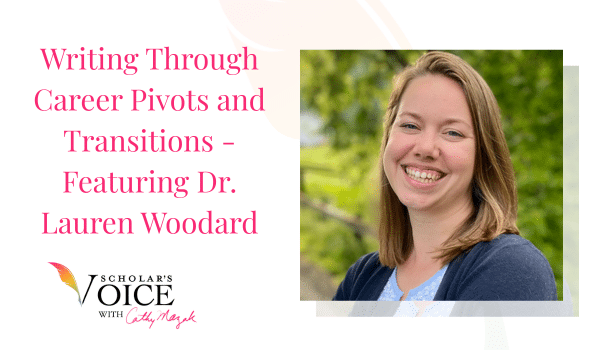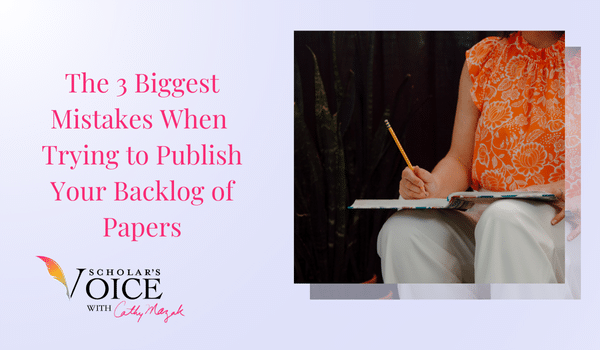Your Top 5 Questions About Academic Publishing Answered

We get a lot of questions about academic publishing and on this podcast I’m sharing answers to the top 5 questions we see.
MORE DETAILS
Writing and publishing in academia is paramount. We get lots of questions about academic publishing, so I’m breaking down answers to the 5 questions we see the most. Let’s jump right in.
Question #1: How do I respond to reviewer comments if I don’t agree with them?
First off, I want to say that peer review is important! It teaches you to be a better article writer and helps you hone your craft. That said, many of us have been in the position of receiving feedback that we do not agree with. Maybe the suggestions made are simply impossible to bring about (changes to vital research, for example), or maybe you just disagree on an epistemological level. What then?
- First make sure you’ve taken a good look at the feedback. Is it possible there is a kernel of helpfulness there?
- Realize that this may indicate the journal in question is not a good fit for you.
- Remember that YOU are the owner and decision maker for this piece. You do not have to make the changes!
- Consider making a table with each feedback note on the left, and how you will address (or not address) the item on the right. If you’re not making a change, explain why but keep it short. You may find the editor is fine with it. If not, then you get to choose your next steps.
Question #2: How do I find a journal to publish my article in?
When choosing a publication to send work out to, it helps to consider where you look for your own references, and who you want your audience to be.
- Look at the reference lists of some of the articles you love and rely on in your own work. If you find some of the same publications appearing in these lists, they might be a good fit for you too.
- Go online and read descriptions and scope for journals you’re considering. Who is on the review boards? Are they people you already read or cite frequently? That’s a good sign.
- Think about your audience. Who do you want reading your work?
Question #3: Should I go for a top tier or mid tier journal?
Top tier journals tend to be prestigious and well known, while mid tier journals are less known by a wider audience and tend to be more niched. There is some truth to the general wisdom suggesting you ‘submit higher and resubmit lower’, but you definitely don’t want to end up not publishing at all because you are holding out for higher tier. I encourage you to consider these 3 questions before you submit:
- What is the article doing for you and your career? Where you choose to submit should fall in line with your larger publishing strategy, and what work you have coming later in your pipeline.
- How does this article fit into the larger scheme of your research trajectory?
- Who is the audience for this piece? If you have a piece that is in a niche or sub-field, a mid tier journal might be a sound choice.
“You’re going to get more eyes on an article…if you publish it in the journals that your niche loves and reads.”
Question #4: How do I know if the publisher reaching out to me is predatory?
Sometimes the answers to this question can be a little murky, depending on field and media type, but let’s get a few easy indicators down first. If you get a generic email that looks like you were cut and pasted into it, or there are a lot of typos, or the wording is strange and clunky, go ahead and delete those.
Depending on your field, a publisher who asks you to pay to publish in their journal could be predatory. However, do your research on this one and look to people in your field because this could just be how things are done in your particular area of study.
If someone is looking for books to publish, it’s possible they might cold email or call you, but look for known and respected publishing houses and expect to still have to go through a normal submission process. Otherwise, exercise caution.
Question #5: How do I make myself work on a writing project when I’ve lost motivation?
I get this question a lot. Here are some things to reflect on and consider:
- If you’re having a hard time motivating for a project, my first question to you is always: when was the last time you took a real break? As I always say, if you’re going to create, you’ve got to restore.
- If you’re in the very last phase of a project and can’t motivate to do those last nitty-gritty details, consider hiring a copy editor. It’s not cheating; I promise. The investment you put in to hire someone and get that project out the door has big returns in terms of the consequences of publishing (promotion, advancement, contribution to your academic brand, etc.)
- Be sure to ask yourself: is this project really serving me? Is it in line with my academic mission and contributing to my brand? If a careful analysis says no, it’s time to cut your losses and move on.
“When is the last time you took a real break?”
If these answers were helpful to you, be sure to subscribe to my podcast, Academic Writing Amplified, where each week I bring relevant content for academics who want to write and publish more while rejecting the culture of overwork in academia.
And consider joining our Navigate: Your Writing Roadmap® program, a 12-week writing and publishing career development program. Click here to learn more about Navigate!
Connect with me:
RELATED PODCASTS
Stay current in Academic Publishing
Subscribe to our newsletter:
In the Pipeline
writing tips, publishing trends, reading recomendations, free workshops





